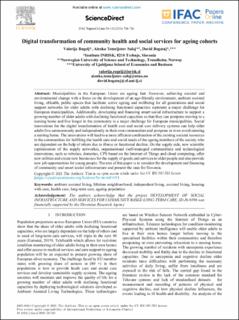| dc.description.abstract | Municipalities in the European Union are ageing fast. However, achieving societal and environmental change with a focus on the development of an age-friendly environment, ambient assisted living, eHealth, public spaces that facilitate active ageing and wellbeing for all generations and social support networks for older adults with declining functional capacities represent a major challenge for European municipalities. Additionally, developing and financing smart social infrastructure to support a growing number of older adults with declining functional capacities so that they can postpone moving to a nursing home and live longer in the community is a major challenge for European municipalities. Social innovations for the digital transformation of health care and social care delivery systems can help older adults live autonomously and independently in their own communities and postpone or even avoid entering a nursing home. The innovations will lead to a more efficient combination of the existing societal resources in the communities for fulfilling the health care and social needs of the ageing members of the society who are dependent on the help of others due to illness or functional decline. On the supply side, new scientific (optimisation of the supply networks), organisational (self-managed communities) and technological innovations, such as robotics, domotics, CPS based on the Internet of Things and cloud computing, offer new utilities and create new businesses for the supply of goods and services to older people and also provide new job opportunities for young people. The aim of this paper is to consider the development and financing of community and smart social infrastructure and present the case for Slovenia. Keywords: ambient assisted living, lifetime neighbourhood, independent living, assisted living, housing with care, health care, long-term care, ageing population | en_US |

